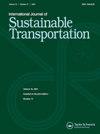Mapping out the current and ideal weekly distribution of remote work in France after COVID-19
IF 3.1
3区 工程技术
Q2 ENVIRONMENTAL STUDIES
International Journal of Sustainable Transportation
Pub Date : 2024-11-04
DOI:10.1080/15568318.2024.2425726
引用次数: 0
Abstract
The recent rise of telework brings new debates on the impacts on travel behavior and transportation systems. One key issue concerns the weekly number and distribution of remote workdays, which affects transportation networks and their congestion levels. Using data from an online survey conducted in spring 2022 in France, Bayesian regressions and a multilevel model are used to analyze employee’s current and ideal weekly number and distribution of full-day home-based remote workdays. Firstly, the findings highlight a latent demand for more remote workdays, especially among people working remotely 1 day a week. Secondly, data show a concentration of current and ideal remote workdays on Fridays, followed by Mondays and Wednesdays. Thirdly, and finally, our results show that employer’s strategies and the nature of the sector (public or private) both contribute to explain the current and ideal weekly distribution of remote workdays. These results indicate that remote work should continue to develop and be distributed unevenly over the days of the week. This uneven distribution should impact travel behavior and traffic congestion.
制定COVID-19后法国当前和理想的每周远程工作分配
最近,远程办公的兴起引发了关于其对出行行为和交通系统影响的新争论。一个关键问题涉及每周远程工作日的数量和分布,这会影响交通网络及其拥堵程度。利用2022年春季在法国进行的一项在线调查的数据,使用贝叶斯回归和多层模型分析了员工目前和理想的每周全职在家远程工作日的数量和分布。首先,调查结果强调了对更多远程工作日的潜在需求,尤其是那些每周远程工作一天的人。其次,数据显示当前和理想的远程工作日集中在周五,其次是周一和周三。第三,也是最后,我们的研究结果表明,雇主的策略和部门的性质(公共或私营)都有助于解释当前和理想的每周远程工作日分布。这些结果表明,远程工作应该继续发展,并且在一周的几天内分布不均匀。这种不均匀分布应该会影响出行行为和交通拥堵。
本文章由计算机程序翻译,如有差异,请以英文原文为准。
求助全文
约1分钟内获得全文
求助全文
来源期刊
CiteScore
8.90
自引率
2.60%
发文量
56
期刊介绍:
The International Journal of Sustainable Transportation provides a discussion forum for the exchange of new and innovative ideas on sustainable transportation research in the context of environmental, economical, social, and engineering aspects, as well as current and future interactions of transportation systems and other urban subsystems. The scope includes the examination of overall sustainability of any transportation system, including its infrastructure, vehicle, operation, and maintenance; the integration of social science disciplines, engineering, and information technology with transportation; the understanding of the comparative aspects of different transportation systems from a global perspective; qualitative and quantitative transportation studies; and case studies, surveys, and expository papers in an international or local context. Equal emphasis is placed on the problems of sustainable transportation that are associated with passenger and freight transportation modes in both industrialized and non-industrialized areas. All submitted manuscripts are subject to initial evaluation by the Editors and, if found suitable for further consideration, to peer review by independent, anonymous expert reviewers. All peer review is single-blind. Submissions are made online via ScholarOne Manuscripts.

 求助内容:
求助内容: 应助结果提醒方式:
应助结果提醒方式:


